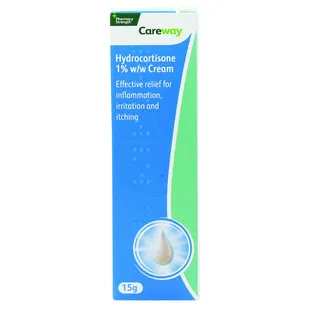Description
What is Hydrocortisone 1% Cream?
Hydrocortisone cream is a topical treatment used to alleviate the symptoms of skin problems, including eczema, dermatitis and insect bites.
What is Hydrocortisone 1% Cream used for?
A number of skin conditions are characterised by inflammatory symptoms, including swelling, irritation, itchiness, redness or dryness. As an anti-inflammatory steroidal medication, Hydrocortisone is used to alleviate these symptoms.
How does Hydrocortisone 1% Cream work?
When the immune system works to fight off illness, it causes a number of inflammatory symptoms we commonly associate with sickness. A fever, for example, is the body’s attempt to fight off illnesses by raising the body’s temperature to a level that is uninhabitable for viruses and bacteria.
When it comes to your skin, there is mounting evidence to suggest disorders such as eczema are conditions known as autoimmune diseases. For people with autoimmune disorders, the body mistakenly thinks its own tissues are foreign and harmful to the body. As a result, the immune system attacks the tissues, causing troublesome symptoms. With eczema, the immune system attacks the skin, causing redness, swelling, and a variety of other symptoms.
Like other steroid medications, Hydrocortisone works by reducing the immune response in the affected area, thereby alleviating the symptoms.
Who can use Hydrocortisone 1% Cream?
Hydrocortisone is generally safe to use for both adults and children. However, it must not be used on children under 10 years old unless a doctor recommends it.
In addition, you must inform your doctor or pharmacist before using Hydrocortisone if you:
- Have had an allergic reaction to Hydrocortisone or any other medicine in the past
- Have a skin infection
- Are pregnant, attempting to become pregnant or breastfeeding
Can Hydrocortisone 1% Cream be used on my face?
Not without the recommendation or a prescription from a doctor. This is because Hydrocortisone reduces the body’s immune response in the area it is applied. Putting it on your face can make some skin conditions such as acne, rosacea and impetigo, worse. You should also not put the treatment on broken or infected skin, or around the genitals.
What are the side effects of Hydrocortisone 1% Cream?
Hydrocortisone is generally well tolerated. Some people may get a burning or stinging sensation when they use it for the first time. This usually goes away after using the cream for a few days.
In more serious cases, Hydrocortisone may make skin infections worse when it is applied to infected areas on the body. You must stop using the cream and tell your doctor straight away if you get:
- Signs of adrenal gland problems, including severe nausea or vomiting, dizziness, fainting, muscle weakness, fatigue, mood changes, loss of appetite or weight loss
- Signs of high blood sugar, including confusion, sleepiness, intense thirst or hunger, frequent urination, flushed skin, rapid breathing or breath that smells like fruit.







Reviews
There are no reviews yet.